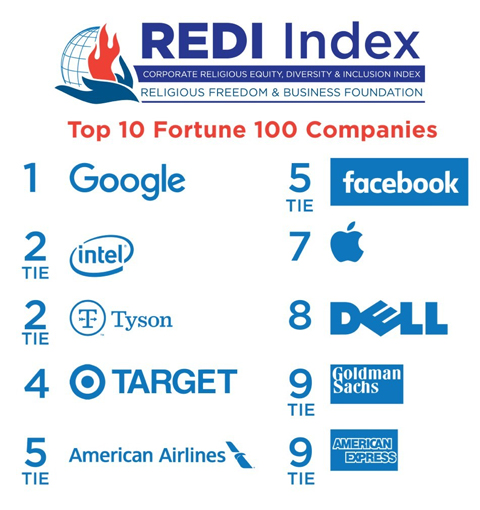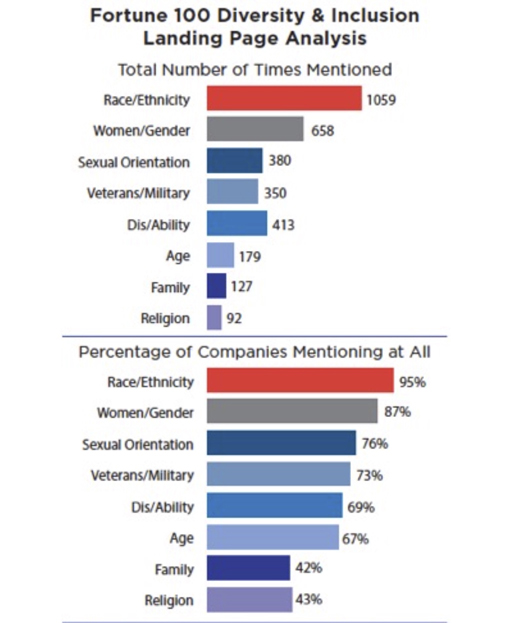A new annual ranking of Fortune 100 companies has revealed that Google leads in a new faith and religion ranking, a diversity and inclusion (D&I) spectrum that many workplaces tend to neglect. The Religious Freedom & Business Foundation’s new corporate Religious Equity, Diversity and Inclusion (REDI) Index gives top marks to major companies like Google/Alphabet, Tyson Foods and Intel for recognising the importance of faith in the lives of their employees.
The REDI Index is a new benchmark that assesses corporate America’s inclusion of religion as an integral part of its diversity initiatives. Despite a positive faith-friendly trend emerging in a number of major corporations, the REDI Index also exposed striking shortfalls among Fortune 100 companies. Most companies on the list continue to overlook religious inclusion in favour of prioritising other important diversity classifications, such as race, sexual orientation, disability or other, according to the study findings.
FAITH-FRIENDLY FIRMS
“Companies scoring well on the REDI Index are using a variety of innovative programmes to make faith expressions more welcome in the workplace, creating a more inclusive environment,” said Dr Brian Grim, President of the Religious Freedom & Business Foundation.
The top 10 companies in the 2020 REDI Index ranking are:
- Google/Alphabet (1st)
- Intel (2nd tie)
- Tyson Foods (2nd tie)
- Target (4th)
- American Airlines (5th tie)
- Facebook (5th tie)
- Apple (7th)
- Dell (8th)
- American Express (9th tie)
- Goldman Sachs (9th tie)
According to the ranking, each of the top 10 companies encourage respectful religious expression in the workplace ranging from the development of faith-based Employee Resource Groups (ERGs) to having corporate chaplains. Alphabet/Google scored highest on the 2020 REDI Index because of the number and diversity of faith and belief-based ERGs mentioned on the company’s website.
INTER BELIEF NETWORK
Google has established an Inter Belief Network (IBN) that aims to create a culture of inclusion, tolerance and mutual understanding at the company. IBN consists of multiple member chapters representing specific communities of interest, including but not limited to Buddhists, Christians, Jewglers [Google’s term] and Muslims. Google’s IBN also aims to ensure that the voices of belief-based communities are represented in Google’s products.
Second in the ranking (with Intel), Tyson Foods openly welcomes what they call ‘the whole person’, when it comes to matters of faith, even fully including those who don’t identify as ‘religious’. The company has 98 dedicated chaplains that can provide compassionate pastoral care to team members and their families, no matter what their religious affiliation or beliefs.

While some of the biggest brands have begun to recognise that respect for faith expression is vital to recruitment, retention and creating a productive work environment, the majority of Fortune 100 companies, however, are neglecting this particular D&I spectrum. The REDI Index revealed that outside of the top 10, many Fortune 100 companies fail to include religion on identity categories, such as race/ethnicity, women/gender, sexual orientation, veterans/military, dis/ability, age and family. “With religious affiliation and diversity continuing to grow worldwide between now and 2050, companies that fail to understand the value of a religiously inclusive workplace are increasingly at a competitive disadvantage,” noted Dr Brian Grim.
KEY FINDINGS
According to the findings, 57 of the Fortune 100’s diversity landing pages fail to make a single mention of faith or religion. Although race or ethnic diversity is mentioned more than 1000 times across company public platforms, religion is only mentioned 92 times. The study also reveals that fewer than 18% of companies mention having faith-related ERGs. In fact, of the 775 ERGs touted by companies, only 5% are related to faith, interfaith, religion or specific religions.
Research findings from the leading global authority on how faith contributes to business and economic success, found that companies that include faith and religion in their D&I programmes are overall more inclusive.

Source: The Religious Freedom & Business Foundation’s REDI Index
COSTLY FAILURES
“Failing to foster religious inclusion can be costly business,” warned Grim. “In 2017, there was a $25 million court finding against Hilton for not reasonably accommodating the religious needs of a dish washer. A high-profile Supreme Court decision was also rendered against Abercrombie & Fitch for putting their ‘looks policy’ above religious non-discrimination. Going beyond the minimum legal requirements, employers are increasingly promoting religious diversity and inclusion in order to strengthen employee recruitment and retention.”
“While companies still have a long way to go to be faith-friendly, with major brands like Walmart, Salesforce, PayPal and others also starting to make this a priority, we are at a tipping point at which we will very likely see greater momentum on this issue in the near future. That’s a great thing for business, especially because it means better, more inclusive workplaces for employees,” added Grim.
Next month, the Religious Freedom & Business Foundation in partnership with the Busch School of Business at Catholic University, will hold a Bringing Your Faith to Work conference in Washington DC, for employees and executives to discuss the importance of corporate programmes that foster religious inclusion. It will feature executives and members of faith-oriented ERGs sharing best practices, challenges and opportunities.
Click here for more information about the event and the full study.







































